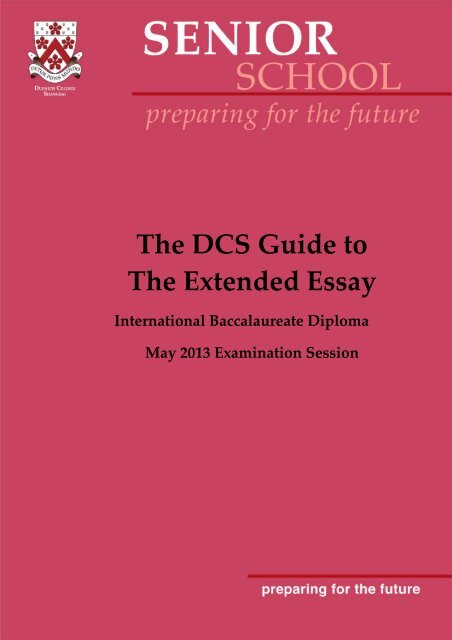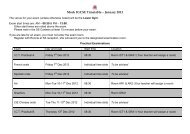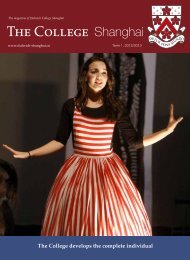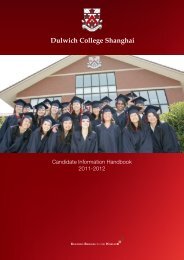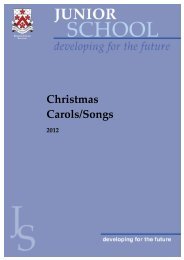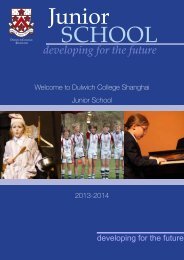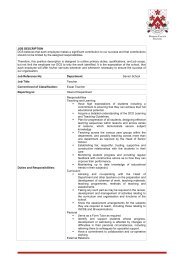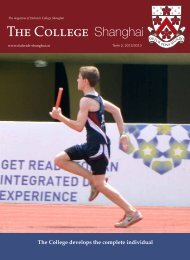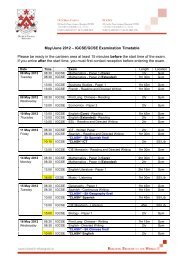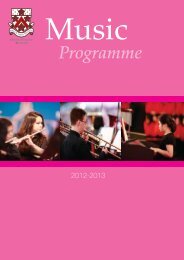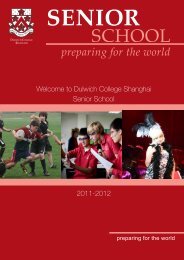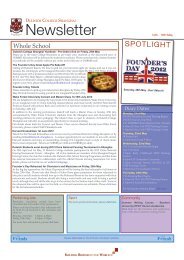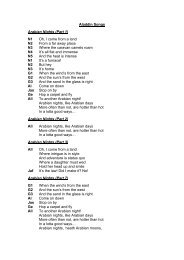Insert Main Title - Dulwich College Shanghai
Insert Main Title - Dulwich College Shanghai
Insert Main Title - Dulwich College Shanghai
- No tags were found...
Create successful ePaper yourself
Turn your PDF publications into a flip-book with our unique Google optimized e-Paper software.
The DCS Guide to<br />
The Extended Essay<br />
International Baccalaureate Diploma<br />
May 2013 Examination Session
INTRODUCTION<br />
Welcome to the 2013 DCS Guide to the IB Diploma Extended Essay. There have been<br />
several more significant changes made this year. Much of the contents of this DCS guide<br />
come from the revised 2013 Extended Essay Guide from IBO. You will notice that the<br />
subject choices available at DCS in which to write the Extended Essay have been revised.<br />
For the first time, the new interdisciplinary „World Studies‟ Extended Essay is now<br />
included. Related to this and other more practical-based subjects, IBO have introduced<br />
new ethical guidelines regarding research and fieldwork.<br />
There are also more internal changes made to the way the Extended Essay is<br />
implemented at DCS, including revised procedures and process to the tutee/supervisor<br />
system. This 2013 guide should be read and used in conjunction with the Extended Essay<br />
Forms booklet: these include the general assessment criteria upon which your essay will<br />
be assessed and the range of forms that will be used for internal monitoring and formative<br />
assessment.<br />
THE NATURE OF THE EXTENDED ESSAY<br />
With the exception of „World Studies‟, the Extended Essay is defined as an in-depth study<br />
of a limited topic within a subject. Its purpose is to provide candidates with an opportunity<br />
to engage in independent research. Emphasis is placed on the process of engaging in<br />
personal research, on the communication of ideas and information in a logical and<br />
coherent manner and on the overall presentation of the extended essay in compliance with<br />
these guidelines.<br />
Many of these general issues, such as the way in which information is handled, the level of<br />
analysis and the quality of argument, are assessed through the general assessment<br />
criteria. In addition to the general assessment criteria, each subject has specific<br />
assessment criteria that qualify these: these are not additional so the maximum number of<br />
marks for any Extended Essay is 36.<br />
The Extended Essay is a core component of the IB Diploma programme and lies at the<br />
heart of the IB Diploma Hexagon. It is an integral compulsory component for candidates<br />
who wish to attain the full IB Diploma. But, as of August 2013, it can also be undertaken<br />
as a separate award in conjunction with IB Diploma Subject Courses.<br />
Page 2
The aim of all IB programmes is to develop internationally minded people who, recognising<br />
their common humanity and shared guardianship of the planet, help to create a better and<br />
more peaceful world.<br />
IB learners strive to be:<br />
Inquirers<br />
Knowledgeable<br />
Thinkers<br />
Communicators<br />
Principled<br />
They develop their natural curiosity. They acquire the skills necessary to conduct<br />
inquiry and research and show independence in learning. They actively enjoy<br />
learning and this love of learning will be sustained throughout their lives.<br />
They explore concepts, ideas and issues that have local and global significance.<br />
In so doing, they acquire in-depth knowledge and develop understanding across<br />
a broad and balanced range of disciplines.<br />
They exercise initiative in applying thinking skills critically and creatively to<br />
recognize and approach complex problems, and make reasoned, ethical<br />
decisions.<br />
They understand and express ideas and information confidently and creatively in<br />
more than one language and in a variety of modes of communication. They work<br />
effectively and willingly in collaboration with others.<br />
They act with integrity and honesty, with a strong sense of fairness, justice and<br />
respect for the dignity of the individual, groups and communities. They take<br />
responsibility for their own actions and the consequences that accompany them.<br />
Page 3
Open-minded<br />
Caring<br />
Risk-takers<br />
Balanced<br />
Reflective<br />
They understand and appreciate their own cultures and personal histories, and<br />
are open to the perspectives, values and traditions of other individuals and<br />
communities. They are accustomed to seeking and evaluating a range of points<br />
of view, and are willing to grow from the experience.<br />
They show empathy, compassion and respect towards the needs and feelings of<br />
others. They have a personal commitment to service, and act to make a positive<br />
difference to the lives of others and to the environment.<br />
They approach unfamiliar situations and uncertainty with courage and<br />
forethought, and have the independence of spirit to explore new roles, ideas and<br />
strategies. They are brave and articulate in defending their beliefs.<br />
They understand the importance of intellectual, physical and emotional balance to<br />
achieve personal well-being for themselves and others.<br />
They give thoughtful consideration to their own learning and experience. They are<br />
able to assess and understand their strengths and limitations in order to support<br />
their learning and personal development<br />
Why is the IB Extended Essay Important to you<br />
The Extended Essay gives “opportunity to investigate an area of special interest.” This is<br />
therefore your chance to pursue an area or question that is of particular interest to you.<br />
It is also very useful for university applications where it provides differentiation between<br />
applicants with similar grades. It is therefore important for students to choose a careerrelevant<br />
title. It could well serve as the interview basis – especially at universities in the<br />
US where a course-related Extended Essay could make all the difference.<br />
Related to this, the Extended Essay can be used for deepening knowledge of a particular<br />
subject. It could be advisable therefore for students at subject HL to undertake university<br />
choice titles.<br />
As evidence would indicate – with the significant number of students gaining 23 points –<br />
the Extended Essay makes all the difference between passing and failing the Diploma.<br />
What is the IB Extended Essay<br />
The Extended Essay is one of the core requirements for the Diploma along with TOK and<br />
CAS. You cannot safely pass the Diploma without completing the EE to a grade D or<br />
above.<br />
The EE should be the result of approximately 40 hours of work by the student. Remember<br />
to keep it in perspective: it is an important part of your IB Diploma programme but you only<br />
need to spend on average ONE hour per week on it. Once started, we recommend you<br />
set aside a period of three to four hours every two weeks. Establish a routine.<br />
Page 4
This is your essay. You select the group, subject and topic which you write on. You may<br />
choose to write your EE in any IB subject, but are much more likely to do better in a<br />
subject you are studying – especially one of your HL subjects.<br />
Your Extended Essay MUST be chosen from ONE of the subject areas given in the IB<br />
Diploma Handbook. You cannot combine subjects unless you are authorised to undertake<br />
a „Global Studies‟ topic. Extended essays cannot be submitted in Theory of Knowledge or<br />
CAS.<br />
Group 1 and 2 language essays MUST be written in a school-based language. So, for<br />
example, you may undertake a Group 1 essay in English or Chinese Mandarin but<br />
Language A1 SSST candidates may not undertake an Extended Essay in that language.<br />
Here at DCS, all others are written in English because this is the language of instruction.<br />
You need to find a supervisor who is a teacher in school to help you.<br />
What subjects are available for the Extended Essay<br />
The availability of subjects to choose from is limited to those subjects that can be<br />
supervised by qualified teachers with experience in that subject. Below is the 2013 list of<br />
subjects that are available. Subjects marked (*) are not subjects being taught at DCS but<br />
MAY be available if a qualified member of teaching staff is able to help. In these cases it<br />
is even more important for students to undertake independent research into the particular<br />
IB Subject Guides, which are available from the IB Diploma Coordinator. Students are<br />
requested not to approach potential supervisors before they have done so.<br />
Group 1<br />
Chinese A Language and Literature<br />
Chinese A Literature<br />
English A Language and Literature<br />
English A Literature<br />
Literature and Performance (in English)<br />
As of 2012, under Group 1 Extended Essays you are able to write a literary based essay<br />
on works in that language OR a combination of native works and World Literature. Or you<br />
may choose to conduct an Extended Essay that explores language in a cultural context<br />
such as in politics, media or advertising. However, care should be taken to ensure that the<br />
emphasis is on language use in writing these essays – not sociological, political and<br />
psychological factors.<br />
Page 5
Group 2<br />
English<br />
French<br />
Mandarin<br />
Spanish<br />
In Group 2, students can choose to do an essay that explores that language OR social<br />
and cultural aspects of that geophysical region. Students may not write a Group 2<br />
Extended Essay in the language they are undertaking as their Group 1 language. So, for<br />
example, a candidate taking English A may not write a Group 2 Extended Essay on<br />
Chinese advertising in English.<br />
Group 3<br />
Business & Management<br />
Economics<br />
Geography<br />
History<br />
Human Rights*<br />
Information Technology in a Global Society (ITGS)*<br />
Peace & Conflict Studies*<br />
Politics*<br />
Psychology<br />
Group 4<br />
Biology<br />
Chemistry<br />
Design Technology*<br />
Environmental Systems & Societies<br />
Physics<br />
Group 5<br />
Computer Science*<br />
Mathematics<br />
Group 6<br />
Film<br />
Music<br />
Theatre Arts<br />
Visual Arts<br />
World Studies (Topics of global significance that may involve one or more subjects above)<br />
may be available to May 2013 candidates depending upon availability of qualified<br />
supervisors. The IB Diploma Coordinator must be consulted first.<br />
Page 6
The Research Process<br />
PREPARING THE ESSAY<br />
Owing to the diversity of subjects and the different approaches to research, this guide<br />
does not offer detailed advice on the methods and skills of research. However, a<br />
systematic process, shaped by the nature of the subject, is essential to generate and<br />
gather information and ideas that can be used to develop a convincing answer to the<br />
specified research question.<br />
The Choice of Subject<br />
The subject in which the Extended Essay is registered must be chosen from the list of<br />
available subjects given in the handbook for procedures of the Diploma programme,<br />
indicated above.<br />
It is advisable to choose the subject for the Extended Essay before deciding what the topic<br />
or research question of the Extended Essay will be. Since the IBO specifies the range of<br />
permitted subjects; certain topics may not be appropriate as an Extended Essay.<br />
The subject chosen for the Extended Essay does not have to be one of the subjects being<br />
studied by the candidate for the Diploma, but care should be taken to choose a subject in<br />
which the candidate has sufficient knowledge and skills. Candidates should also base the<br />
choice of subject on the level of personal interest they have in that particular subject.<br />
It is also to be remembered that whatever subject and/or topic is chosen, it must not<br />
contain any repetition of what material has been covered in class and must therefore be<br />
an extension of that knowledge.<br />
The Choice of Topic<br />
The topic of the Extended Essay is the particular area of study within the chosen subject.<br />
Before a final decision is made about the choice of topic the relevant subject guidelines<br />
should be carefully considered.<br />
Candidates should aim to choose a topic that is both interesting and challenging to them.<br />
The topic chosen should be limited in scope and sufficiently narrow to allow candidates to<br />
examine an issue or problem in depth. It should present the candidate with the<br />
opportunity to collect or generate information and/or data for analysis and evaluation.<br />
Candidates are not expected to make a contribution to knowledge within a subject.<br />
Page 7
A broad topic is unlikely to result in a successful Extended Essay, a topic that requires no<br />
personal research and/or requires an essentially narrative or descriptive approach is not<br />
suitable for an Extended Essay. Similarly, although a reliance on secondary sources is<br />
sometimes necessary, an Extended Essay, which only provides a summary of such<br />
sources, will not be successful. Writing a précis of a well-documented topic is unlikely to<br />
result in a successful Extended Essay.<br />
The Research Question<br />
When an appropriate topic has been chosen, candidates should narrow the focus of the<br />
investigation and formulate a specific research question. For many Extended Essays this<br />
will be phrased in the form of a question but alternatives such as launching the<br />
investigation with a hypothesis are acceptable. Indeed some may argue that stating a<br />
premise and mounting an argument in its defence may provide more purpose and focus.<br />
By frequently referring to this research question, candidates should be able to maintain the<br />
purpose and orientation of the investigation. Candidates are encouraged to formulate a<br />
challenging research question but to ensure that it can be explored within the constraints<br />
of essay length, time and resources available to them.<br />
It is also important to make sure that enough information is available about the topic to<br />
conduct fruitful research. If there is any uncertainty about this, it is recommended to make<br />
an appointment with the Senior Librarian to discuss the matter.<br />
The Research Question may be stated in the title, title page, or defined in the introduction;<br />
if only stated in the title or title page, it should be restated in the introduction. It is not<br />
sufficient to state it only in the abstract or on the cover sheet. The Research Question<br />
maybe stated as a hypothesis rather than a question.<br />
The Length of the Extended Essay<br />
The EE is presented as a formal piece of scholarship containing no more than 4,000<br />
words. The upper limit of 4,000 words for all extended essays is rigid. However, this<br />
upper limit includes the introduction, the body, the conclusion and any quotations, but<br />
does NOT include:<br />
<br />
<br />
<br />
<br />
<br />
<br />
the 300 word abstract<br />
acknowledgments<br />
the contents page<br />
maps, charts, diagrams, annotated illustrations and tables<br />
equations, formulas and calculations<br />
citations/references (whether parenthetical or numbered)<br />
Page 8
footnotes or endnotes<br />
the bibliography<br />
appendices.<br />
Extended Essays containing more than 4,000 words are subject to penalties and<br />
examiners are not required to read material in excess of the word limit.<br />
With regards to tables and diagrams, intrinsic information or summative information is not<br />
included in the word count. However, if the text included in the table or diagram is<br />
additional information that is an integral part of the essay, then the words are counted.<br />
The difference between references and citations should be made. DCS uses the MLA<br />
system of citation and referencing: any words included in the parentheses citation – such<br />
as (Brown, P26) – are not included.<br />
Formal Presentation<br />
The Extended Essay should be written in a clear, correct and formal style appropriate to<br />
the subject from whom the topic is drawn. The Senior Library several useful writing guides<br />
available for the different subjects. Please consult the Senior Librarian for advice. Criteria<br />
for presentation are:<br />
<br />
<br />
<br />
<br />
<br />
Overall presentation and neatness<br />
Well displayed illustrations<br />
Contents page clearly set out<br />
Pages are numbered<br />
References/bibliography are consistent, using MLA citation style, and in<br />
alphabetical order of author.<br />
Page 9
ORGANISING THE ESSAY<br />
The majority of Extended Essays will follow a structure similar to that described below:<br />
<strong>Title</strong><br />
The title should provide a clear indication of the focus of the essay. It should be precise<br />
and does not necessarily have to be phrased in the form of a question.<br />
Abstract<br />
An abstract not exceeding 300 words must be included. It does not serve as an<br />
introduction but presents a synopsis of the Extended Essay to encourage candidates to<br />
examine closely the development of an argument within the Extended Essay and the<br />
pertinence of any conclusions that are reached. It is also designed to allow readers to<br />
understand quickly the contents of the extended essay.<br />
The minimum requirements for the abstract are to state clearly:<br />
The research question being investigated<br />
The scope of the investigation<br />
The conclusion/s of the Extended Essay<br />
<br />
(The abstract should be on a separate page, and placed immediately after the title page.)<br />
Contents Page<br />
A contents page must be provided at the beginning of the Extended Essay and all pages<br />
should be numbered. An index is not required.<br />
Introduction<br />
The introduction should include:<br />
An indication of why the topic chosen is interesting, important or worthy of study<br />
Some background information and an attempt to place the topic in an appropriate<br />
context<br />
An indication of whether the topic has been narrowed to a focus of more<br />
manageable proportions<br />
A clearly and precisely stated research question<br />
A clear concluding statement of the thesis and argument, e.g. the response to the<br />
research question that will subsequently be developed in the body of the essay<br />
Page 10
Body/Development<br />
The essential feature of the major section or body of the essay is the systematic<br />
development of a convincing answer to the research question. The structure and the<br />
approach to this section will be shaped by the conventions of the particular subject in<br />
which the extended essay is being undertaken. Some subjects may require sub-headings<br />
for major sections within the main body. For example, scientific investigations will usually<br />
have separate sections for method and results. In some other subjects, however, subheadings<br />
should be avoided because they disrupt the flow and unity of an essay.<br />
Conclusion<br />
The requirements of the conclusion must be<br />
Clearly stated<br />
Relevant to the research question being investigated<br />
Substantiated by the evidence presented<br />
Indicative of issues, unresolved questions and new questions that may have<br />
emerged from the research<br />
Formal Presentation<br />
The Extended Essay should be written in a clear, correct and formal style appropriate to<br />
the subject from whom the topic is drawn. The Senior Library several useful writing guides<br />
available for the different subjects. Please consult the Senior Librarian for advice. Criteria<br />
for presentation are:<br />
Overall presentation and neatness<br />
<br />
<br />
<br />
<br />
Well displayed illustrations<br />
Contents page clearly set out<br />
Pages are numbered<br />
References/bibliography are consistent, using MLA citation style, and in<br />
alphabetical order of author.<br />
References/Bibliography<br />
The direct or indirect use of the words of another person, written, oral or electronic, must<br />
be acknowledged appropriately as must visual material in the essay, derived from another<br />
source. A candidate‟s failure to comply with this requirement will be viewed as plagiarism,<br />
and will therefore be treated as a case of malpractice.<br />
Page 11
The bibliography or list of references should include only those works, which have been<br />
consulted by the candidate.<br />
DCS has adopted the MLA citation style school-wide and this is the format that will be<br />
used for the Extended Essay. It is recommended for readability of the Essay to use in text<br />
parentheses rather than footnotes.<br />
On the Senior School Library Wiki instructions can be found on how to cite different types<br />
of sources, and how to access different citation machines to produce a consistent<br />
bibliography. An online version of the MLA Handbook is also available, for reference on<br />
the Library Wiki. When there is uncertainty about which sources to cite and how to do it,<br />
please consult the Senior Librarian.<br />
The Senior Library Wiki can be accessed at http://readingisdestiny.wikispaces.com.<br />
Appendices<br />
Apart from graphic material, materials in other media may be submitted only as supporting<br />
appendices and should not detract from the written Extended Essay.<br />
Appendices are not an essential section of the Extended Essay and an examiner is not<br />
required to read them. So care should be taken to include all information of direct<br />
relevance to the analysis and argument within the main part of the essay. Unless<br />
considered essential, complete lists of raw data should not be included in the Extended<br />
Essay. It should not constantly refer to material presented in an appendix as this may<br />
disrupt its continuity. The use of photographs and postcards is acceptable only if they are<br />
captioned and/or annotated and are used to illustrate a specific point made in the<br />
Extended Essay.<br />
Illustrations<br />
Presentation and overall neatness are important, and it is essential that illustrative<br />
material, if included, is well set out and used effectively. Graphs, diagrams, tables and<br />
maps are effective only if they are well labelled and can be interpreted with ease.<br />
Appendices are not an essential section of the extended essay an examiner are not<br />
required to read them, so care should be taken to include all information of direct<br />
relevance to the analysis.<br />
Page 12
Computers<br />
The use of computers is encouraged where they are appropriate as tools for analysing<br />
data relevant to the subject of the Extended Essay. Material such as a hard copy of<br />
computer output may be included in the Extended Essay, but any associated programme<br />
should be referred to or reproduced, if original, only as an appendix.<br />
Only in computer science and physics (in particular circumstances) may programmes be<br />
included as part of the extended essay. (See subject guidelines for computer science, and<br />
for Physics, for further details.)<br />
Videotapes<br />
The use of videotapes as supporting material is not permissible.<br />
Audiotapes<br />
The use of audiotapes as supporting material is permissible, but is not encouraged, and<br />
extra merit will not be given for the inclusion of audiotapes in support of an Extended<br />
Essay. Digital audiotapes are not acceptable.<br />
Specimen Materials<br />
Specimen materials used in your investigations that do not form part of the Extended<br />
Essay must not be submitted. Photographic evidence may be submitted in place of such<br />
material.<br />
Page 13
HOW THE EXTENDED ESSAY IS ASSESSED<br />
As has been already suggested, the Extended Essay is awarded marks according to<br />
general and subject-specific assessment criteria. These are to be read together because<br />
the general criteria are often modified by the subject-specific criteria. For example, under<br />
Criteria I (Formal Presentation), there may slight differences required in a Group 4 science<br />
subject than in a Group 1 Language A essay. In total, however, every essay is awarded a<br />
mark out of 36.<br />
There are eleven criteria in total and it is important to remember that, while the whole<br />
essay is assessed by an external examiner, criteria K (Holistic Judgement), is indicated by<br />
the internal school EE Supervisor. It is also important to remember that the school has to<br />
indicate what the Supervisor thinks the essay has achieved.<br />
Criteria<br />
Mark<br />
A Research question /2<br />
B Introduction /2<br />
C Investigation /4<br />
D<br />
Knowledge and understanding of the<br />
topic studied<br />
/4<br />
E Reasoned argument /4<br />
F<br />
Application of analytical and evaluative<br />
skills appropriate to the subject<br />
/4<br />
G<br />
Use of language appropriate to the<br />
subject<br />
/4<br />
H Conclusion /2<br />
I Formal presentation /4<br />
J Abstract /2<br />
K Holistic judgment /4<br />
TOTAL /36<br />
Once the external examiner has read the essay, they will award a mark out of 36 and<br />
grade it according to the following grade boundaries:<br />
A 36 – 30<br />
B 29 – 25<br />
C 24 – 17<br />
D 16 – 9<br />
E 8 – 0<br />
Page 14
Extended Essay .<br />
IBCA then may moderate marks but will then coordinate a candidate‟s grades for both<br />
Extended Essay and TOK according to the new 2010 table below:<br />
Theory of Knowledge<br />
Excellent Good Satisfactory Mediocre Elementary Not<br />
Submitted<br />
A B C D E<br />
Excellent 3 3 2 2 1 + FC N<br />
A<br />
Good 3 2 1 1 FC N<br />
B<br />
Satisfactory 2 1 1 0 FC N<br />
C<br />
Mediocre 2 1 0 0 FC N<br />
D<br />
Elementary 1 + FC FC FC FC Failing<br />
E<br />
condition<br />
Not<br />
Submitted<br />
N N N N N N<br />
N<br />
Notes<br />
1) If you fail to submit an Extended Essay, you are given an „N‟.<br />
2) Failing Condition (FC)*: An „E „in either TOK or the Extended Essay is a failing<br />
condition. However, provided your total diploma score is 28 or more, you can carry<br />
one failing condition and still be awarded the diploma. Nevertheless, having a failing<br />
condition puts your diploma at risk (if you get 24-27 points, or if you have another<br />
failing condition).<br />
3) An „N‟ in any subject, including TOK, means you will not be awarded a diploma.<br />
Page 15
EXTENDED ESSAY TUTEES AND SUPERVISORS<br />
As of this year, 2012-2013, there are more revisions made as to how we organise the<br />
system of Extended Essay candidates and their Supervisors. In the past there has been<br />
some misunderstanding as to the relationship between the two.<br />
First all of all, it should be remembered that the relationship between a student and their<br />
supervisor has to be built on mutual trust and respect. A supervisor is willing and able to<br />
help a student who is willing to meet their obligations.<br />
When it comes to signing the final coversheet, the supervisor must indicate how many<br />
hours have been spent with the candidate. The IBO expects between 2 to 4 hours in total.<br />
This means that the student must be very well prepared for all meetings set with their<br />
supervisor and that work should be sent ahead if possible.<br />
This year it should be understood that no member of the teaching staff are obliged to<br />
undertake the role of Extended Essay Supervisor unless they feel qualified and able to do<br />
so. It should also be made clear that the candidate has to take responsibility for their<br />
whole Extended Essay process and they have to understand that it is they who must<br />
initiate meetings with Supervisors and ensure that all directed work is completed on time in<br />
accordance with the published deadlines.<br />
It is important to remember that the Supervisor is responsible for completing the Extended<br />
Essay coversheet that includes comments that will be the basis of Criteria K (Holistic<br />
Judgement). The Supervisor will comment upon a student‟s initiative, enthusiasm, selfdiscipline,<br />
motivation, reliability and resourcefulness.<br />
At the beginning of the Extended Essay process, students will be issued with an Extended<br />
Essay Proposal Form‟ and an IB Extended Essay Research Form‟ that they need to<br />
complete as fully as possible. These completed forms are then submitted to the IBDC<br />
who will then pass them on to the Head of Department or Subject Leader of that subject<br />
who will then allocate/confirm a Supervisor to that candidate.<br />
In order to establish a good working relationship with the Supervisor from the start, it is<br />
essential that you carefully think through and show sufficient evidence to support your EE<br />
proposal.<br />
Responsibilities of Student<br />
Consult your Supervisor at every stage. If you are unsure then please see the IB<br />
coordinator.<br />
Page 16
Refer frequently to this guide. Check your work against the General Criteria for<br />
your subject. Keep a copy of these for yourself.<br />
YOUR SUPERVISOR WILL NOT CHOOSE YOUR TOPIC, CORRECT OR EDIT<br />
YOUR DRAFT, OR CHECK YOUR CALCULATIONS. The Supervisor may<br />
suggest approaches or sources for you to consider, but the decision to take or<br />
reject advice is YOURS. The essay is for YOU to plan, design and write. YOUR<br />
SUPERVISOR IS NOT RESPONSIBLE FOR ITS SHORTCOMINGS OR FOR ITS<br />
SUCCESS.<br />
IF YOU ARE CARELESS ABOUT CITING WORKS OR OTHER MATERIAL<br />
THAT YOU HAVE USED OR CONSULTED, YOUR ESSAY MAY BE REJECTED<br />
FOR PLAGIARISM. DO NOT TAKE THIS RISK. AVOIDING PLAGIARISM,<br />
WHETHER INTENTIONAL OR NOT, IS YOUR RESPONSIBILITY (you will<br />
submit your Essay to www.turnitin.com for an originality check).<br />
ALWAYS remember that whatever you include as part of your essay MUST HAVE<br />
documented evidence in support of it. You must show your Supervisor the books,<br />
material or evidence BEFORE you include it in your essay. If you do not, your<br />
Supervisor may refuse to sign off on your essay report.<br />
Planning your essay is VERY IMPORTANT. DO NOT LEAVE THINGS UNTIL<br />
THE LAST MOMENT.<br />
An Extended Essay cannot be done by sticking to your textbook. You must read<br />
WELL beyond the basic requirements to pass your subject.<br />
The Supervisor<br />
Provides guidance with selecting a topic, formulating the research question,<br />
access to resources, assisting with techniques of data collection, proper<br />
acknowledgment and citation of sources and writing an abstract. The Senior<br />
Librarian can advise here too.<br />
Reads and comments up to and on the first draft only but is not permitted to edit<br />
the draft thereafter.<br />
Is responsible for ensuring that the Extended Essay is the candidate‟s own work.<br />
To this end, the students are asked to submit their Essay to www.turnitin.com, to<br />
which DCS is subscribed. The „originality check‟ report is then discussed with the<br />
Supervisor, to ensure that all sources and used quotes are cited and referenced<br />
properly. For details on opening an account with Turnitin, please contact the<br />
Senior Librarian.<br />
Ensures the candidate‟s declaration on page 1 of the cover is signed.<br />
Ensures that the Supervisor‟s declaration on page 2 of the cover has been signed.<br />
Conducts the „Viva Voce‟ final interview and completes the Extended Essay „Gold<br />
Form‟ coversheet comments section.<br />
Page 17
Dates and Deadlines May Session 2013<br />
<br />
<br />
<br />
<br />
<br />
<br />
<br />
<br />
<br />
<br />
<br />
<br />
<br />
<br />
Introduction to EE, and general assessment criteria DCS<br />
Guide to the Extended Essay (EE) presented. Guidebook, EE<br />
general assessment criteria, EE Subject handed out to all students<br />
within the designated EE workshops.<br />
Subject EE Workshops<br />
Potential subject-specific topics will be introduced in normal Year<br />
12 classes and the Heads of Departments will outline the subjectspecific<br />
assessment criteria.<br />
EE Research Question and Skills<br />
All students are required to attend the sessions below, where an<br />
introduction will be provided into academic research, guidance to<br />
the school‟s online databases and how to create consistent<br />
citations.<br />
Copies of EE/PP/1 Forms and IB Extended Essay Research<br />
Forms to IBDC<br />
Choice of subject and EE Subject Proposal and Planning Forms to<br />
be completed, signed by students, parents and advising teachers,<br />
and given to IBDC<br />
* IB Diploma Coordinator provides the Heads of Department<br />
(HOD) with relevant EE/PP/1 forms. HOD to discuss with<br />
departments and confirm Supervisor<br />
* All Proposal Forms copied and filed with the IB Diploma<br />
Coordinator and supervisors appointed and notified<br />
EE Supervisors Allocated by HOD and Confirmed with<br />
Students<br />
EE Student and Supervisor Meetings. Supervisors submit<br />
copies of completed and signed EE/CON/2 forms to IBDC<br />
Students to meet with their Supervisors and talk over choice of<br />
topic, question, research methods, texts, etc some material may be<br />
distributed at this point.<br />
EE/CON/2 forms to be completed, signed and returned to the IB<br />
Diploma Coordinator.<br />
All students to have a meeting with the Senior Librarian as well, to<br />
discuss available research materials and suitability of the research<br />
question.<br />
Student/Supervisor Meetings # 1 finished, copies of EE/IOF/3<br />
(Initial Outline) to IBDC.<br />
1000 word Initial Draft and Supervisor Meetings<br />
An initial 1000 word draft handed in to Supervisors. Form<br />
EE/IDG/4 is completed by the Supervisors, discussed with<br />
candidate, and then filed with the IB Diploma Coordinator.<br />
Thursday, 23 rd February 2012<br />
Monday, 27 th February to Wednesday,<br />
29 th February 2012<br />
Thursday, 1 st March 2012<br />
Thursday, 15 th March 2012<br />
Monday, 19 th March 2012<br />
Thursday, 22 nd March 2012<br />
Friday, 30 th March 2012<br />
Thursday, 17 th May 2012<br />
Page 18
Copies of EE/IDG/4 Form 1 to IBDC Thursday, 24 th May 2012<br />
EE Student/Supervisor Meetings # 2<br />
<br />
<br />
<br />
Supervisors are to give feedback on the preliminary outline and<br />
provide summer reading tasks if required.<br />
Set requirements and expectations for the August 2012 deadline<br />
of first full draft.<br />
Meet with the Senior Librarian for final guidelines and advice<br />
Monday, 11 th to Friday, 15 th June 2012<br />
<br />
<br />
Essay Drafting and Development<br />
Students are expected to carry out research and begin drafting and<br />
developing their essays. Email contact with the supervisor is at the<br />
discretion of the Supervisor<br />
July – August 2012<br />
EE Student/Supervisor Meetings # 3<br />
<br />
Meet with Supervisor to discuss and review the Extended Essay<br />
draft (thesis, data, analysis, notes).<br />
August 2012<br />
<br />
<br />
EE First Full Draft<br />
Candidates are expected to submit their first full draft to their<br />
Supervisor. Supervisor will complete EE Feedback Form 2 and a<br />
copy is to go to the IBDC<br />
September 2012<br />
EE Student/Supervisor Meetings # 3<br />
<br />
<br />
Candidates are expected to meet with their supervisors to review<br />
their essays and prepare for the final submission.<br />
September 2012<br />
<br />
<br />
<br />
<br />
<br />
<br />
<br />
Abstract and Final Checklist<br />
Year 13 students will attend the Abstract workshop and receive<br />
feedback from the IB Diploma coordinator.<br />
Final checklist form to be completed and filed with the IB<br />
coordinator<br />
Academic Honesty and Turnitin.com<br />
Turnitin.com originality check workshop with the Senior Librarian.<br />
Attendance is required.<br />
Students submit their Essay to www.turnitin.com and discuss the<br />
result with the Supervisor to make sure that no plagiarism has<br />
occurred.<br />
Students MUST supply copy of Turnitin.com report to Supervisor.<br />
Extended Essay Final Submission<br />
Final Essay submission (two hard copies, IB Diploma Coordinator<br />
and Library plus a soft copy). Supervisors to give second copy<br />
directly to Senior School Library.<br />
Evaluation and ‘Viva Voce’ Interviews<br />
EE evaluated against IBO criteria<br />
September 2012<br />
September 2012<br />
October 2012<br />
October 2012<br />
Page 19
„Viva Voce‟ carried out by the Supervisors<br />
Feedback is to be given by the Supervisors to the students.<br />
EE ‘Gold Forms’ Completion<br />
Gold Forms completed and signed by the supervisors. Collated by<br />
the Heads of Department and submitted to the IB Diploma<br />
Coordinator. Supervisors should give an estimated grade.<br />
Submission to Examiners<br />
Extended Essays are sent to the IBO.<br />
February 2013<br />
15 th March 2013<br />
Extended Essay Supervisors 2012-13<br />
The Extended Essay Guidelines for the IB Diploma Examinations 2013 will be handed to the Year<br />
12 students in February 2012. The general criteria, which Heads of Department have a copy of,<br />
provide clearer guidance about how the EE Rubric relates to each particular subject area. The<br />
subject specific guidelines will be given to the students by Supervisors. The Heads of Department<br />
will appoint the supervisors in consultation with the IB Diploma Coordinator.<br />
Candidates wishing to undertake a „Global Studies‟ EE must consult the IBDC first.<br />
As of 2011, Extended Essay Supervisors will only be allocated up to FIVE candidates: this is to<br />
ensure that the EE procedure and supervision is manageable.<br />
The teaching staff available as EE Supervisors in 2012 are<br />
Group One:<br />
Mr. Peter Ubly<br />
Mr. Anthony Reich<br />
Mrs. Christine Van de Casteele<br />
Mr. Martyn Fernandes<br />
Ms. Min Dai<br />
Ms. Nicole Glisson<br />
Group Two:<br />
Ms. Erin Crowden<br />
Mr Martyn Fernandes<br />
Mr. Christophe Truglio<br />
Mr. David Escat<br />
Mr. Andy Clapperton<br />
Ms. Annie Wang<br />
A1 Languages<br />
English A1<br />
English A1/Film<br />
English A1<br />
English A1<br />
Chinese A1<br />
Literature and Performance<br />
Group 2 Languages<br />
English B<br />
English B<br />
French B<br />
Spanish B<br />
Spanish B<br />
Mandarin B<br />
Page 20
Group Three:<br />
Ms. Tejinder Rajput<br />
Ms. Alex Murphy<br />
Mr. Peter Oldfield<br />
Mr. Paul Murphy<br />
Mr David Dale<br />
Mr. Stephen Johnson<br />
Mr. Dean Faught<br />
Ms. Shelley Monk<br />
Ms. Claire Izat<br />
Mr Jon Byron<br />
Group Four:<br />
Mr. Thomas Edwards<br />
Ms. Marie Lincoln<br />
Ms. Kathryn Barnard<br />
Mr. Bryn Hughes<br />
Mrs. Caroline Wood<br />
Mr. Nico Van de Casteele<br />
Group Five:<br />
Individuals and Societies<br />
Psychology<br />
Psychology<br />
Economics<br />
Economics<br />
Business and Management<br />
History/Politics/Human Rights<br />
History<br />
Geography<br />
Geography<br />
ITGS<br />
Experimental Science<br />
Biology/ESS<br />
Biology<br />
Biology<br />
Physics<br />
Chemistry<br />
Chemistry<br />
Mathematics<br />
Mrs. Lynda Evans<br />
Mrs. Julie Thomas<br />
Mr. Graham Pyper<br />
Mr. Adam Knowles<br />
Mr. Jimmy Mao<br />
Ms. Anna Haraszti<br />
Group Six:<br />
Mr. Lawrence McGrath<br />
Ms. Sarah Harris<br />
Mr. Matt Goss<br />
Ms. Stephanie Grafe<br />
Mr. Ashleigh Huxtable<br />
Ms. Nicole Glisson<br />
Mr. Anthony Reich<br />
Arts<br />
Visual Arts<br />
Visual Arts<br />
Music<br />
Music<br />
Theatre Arts<br />
Theatre Arts/Literature and Performance<br />
Film<br />
Page 21


